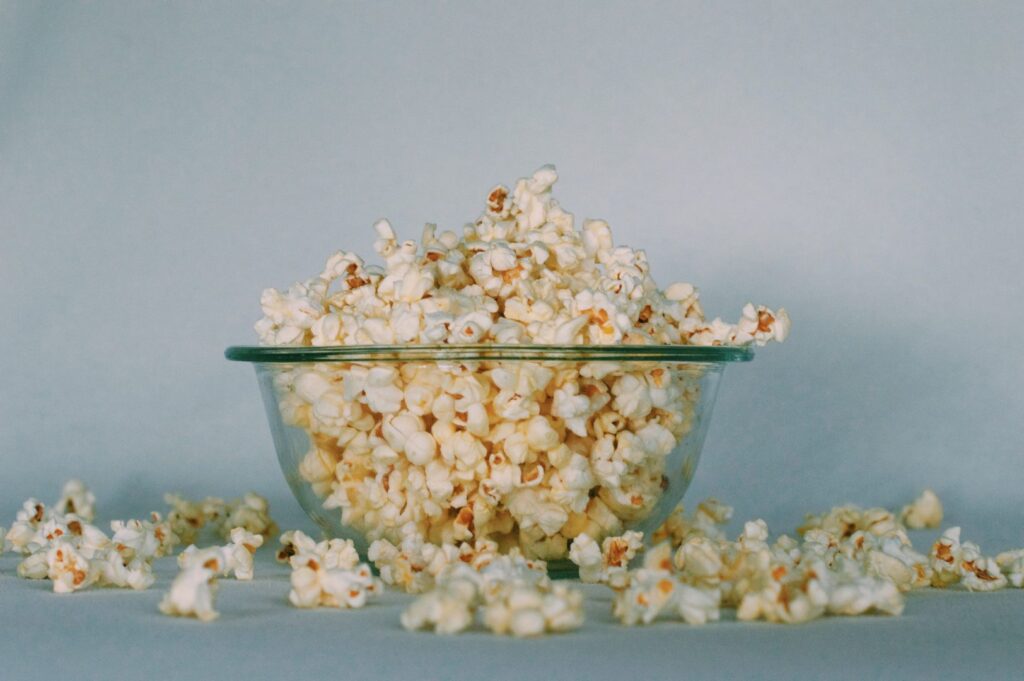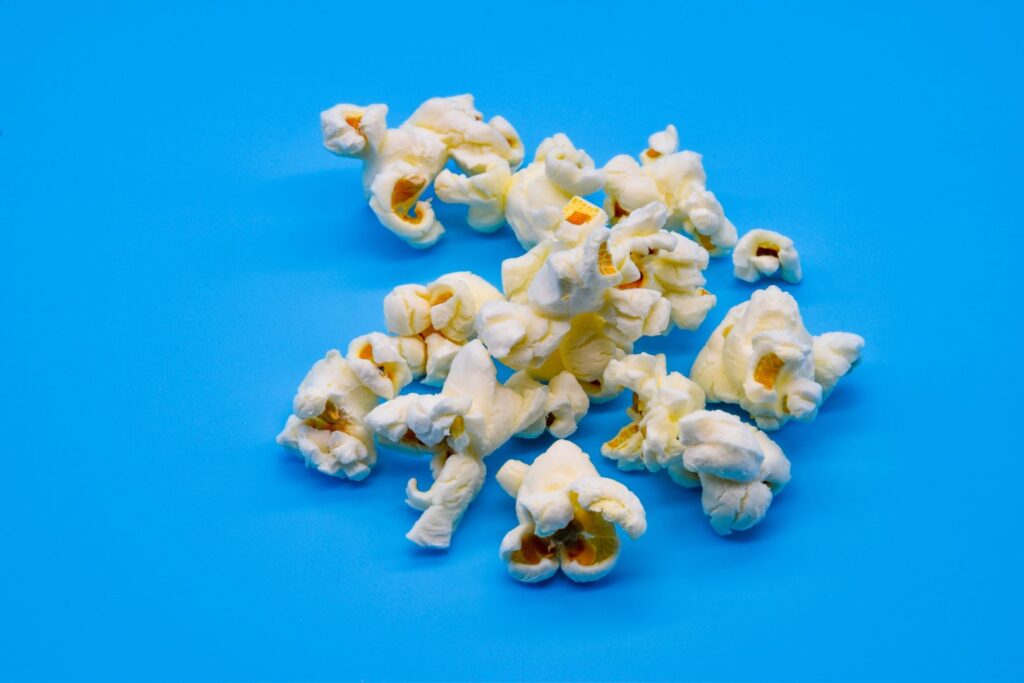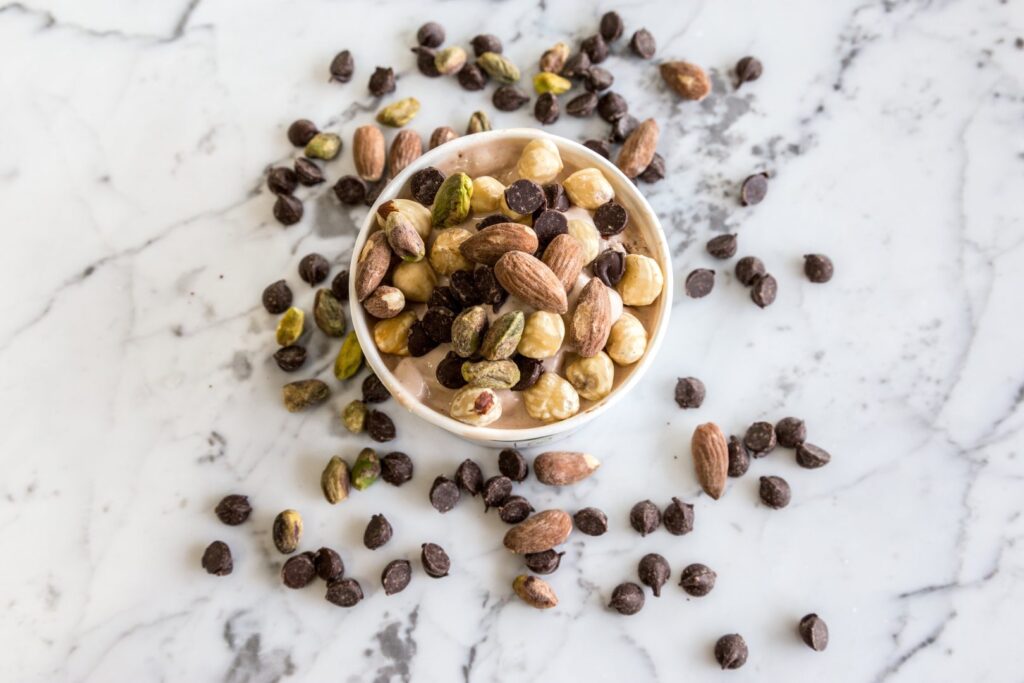Popcorn is probably many kids’ favorite snack. The corn-based snack has filled many tummies and childhood memory books.
But the problem with popcorn is that it isn’t easy to eat, especially for younger kids. No wonder many parents stress when their kids eat it.
So, parents ask themselves when they can let their kids try popcorn and decide whether it’s their go-to snack.
In today’s article, we’ll answer all your questions regarding popcorn and find out whether it’s safe for your little cuties.
Why do Kids Like Popcorn so Much?
Popcorn is one of the snacks that just has “that” specific taste. And have you ever wondered why it is so tasty?
Well, if you thought that the taste of popcorn comes from the corn kernel, you’re wrong! The specific taste comes from the oil combined with the salt.
In addition, if you add butter to your popcorn, it enhances the flavor even more. I avoid adding butter to my children’s popcorn since it contains many fats.
Lastly, some manufacturers, and especially movie theatres, add seasoned salt called flavacol to popcorn, which makes it even tastier and more addictive.

When Can Kids Try Popcorn?
As we already mentioned, giving kids popcorn too early might not be the best decision you can make as a parent.
Medical professionals advise that parents should avoid giving popcorn to kids until about the age of four.
Although four-year-old kids think of themselves as grown-ups, you still have to be careful when giving them their favorite snack.
So, remember to remove any unpopped corn kernels in your kid’s popcorn, and remind your little one to chew carefully.
If you think that your kid isn’t ready to consume this tasty snack at four years old, then try giving it to your child later.
Is Popcorn a Healthy Snack for Kids?
Popcorn is not only a tasty treat. It’s also quite a healthy snack for younger kids who need energy for their everyday antics.
Popcorn comes from corn (logically), so it’s one of the most nutritious treats in the world, while also having top-notch flavor.
Popcorn contains a lot of fibers, which supply your kids with enough food to keep their little tummies full.
Also, fibers help your kids with digestion and bowel movements, lower cholesterol levels, and control the level of sugar in the blood.

Moreover, popcorn also contains many other nutritional substances, such as vitamins B1, B2, B3, magnesium, iron, and phosphorus.
Avoiding adding too much salt, oil, and butter to your kid’s popcorn makes it an even healthier treat for little kids.
Can Popcorn Be Dangerous for Younger Kids?
If you’re a popcorn enthusiast, you probably know that some corn kernels remain whole after popping the corn.
Those whole bits can easily choke younger kids, especially babies. So, even if you give kids popcorn, try to filter it out from the unpopped corn kernels.
Moreover, corn kernels are tough to digest, meaning they can also cause tummy troubles in your little ones.
That’s why it’s crucial to avoid giving your kids popcorn when they are aware of how dangerous it can be if they eat it uncarefully.
Last but not least, people have a bad habit of adding seasoned salts, oils, and lots of butter to a popcorn bucket.
Although it makes popcorn taste better, salts and oils are unhealthy and can increase the risks of:
- Weight gain;
- Bloating;
- Diabetes;
- High blood pressure;
- Decreased blood flow;
Exposing kids to such unhealthy supplements can increase the chances of them developing dangerous diseases later on in life.

What to Do if a Child Chokes on Popcorn?
The worst-case scenario that can happen as a result of recklessly eating popcorn is your kid choking on it.
According to professionals, if your child starts choking on popcorn but is still breathing, keep calm and encourage your child to cough it out.
Most of the time, coughing will help, but sometimes corn kernels might not come out, which can lead to your kid stopping to breathe.
If that’s the case, call an ambulance first and then start giving your kid first aid. The first aid steps are different according to your kids’ age.
· For Infants (0-12 Months)
Put your infant across your knees, in a face-down position, with its head lower than the chest. Make sure your infant remains in this position.
Next up, deliver five back blows. Place the back blows between the shoulder blades of your infant. Check if the piece of popcorn is dislodged after every hit.
If this is unsuccessful, place your infant on its back and deliver five chest thrusts using your two fingers.
If the piece still isn’t coming out, repeat the pattern of five back blows and five chest thrusts until medics arrive.
· For Older Kids (12+ Months)
Your kid should lean forward with its head lowered. If your kid can’t do that, lie it down on its side.
Next up, deliver five back blows. Place the back blows between the shoulder blades of your kid. Check if the piece of popcorn is dislodged after every hit.
If this is unsuccessful, lie your kid on its back and deliver five chest thrusts using the heel of your hand.
If the piece still isn’t coming out, repeat the pattern of five back blows and five chest thrusts until medics arrive.
Alternatives for Popcorn
I understand if you don’t want to give your kids popcorn. It’s totally OK to prevent all those dangers from knocking on your doors.

Luckily, there are many substitutes for the corn-packed treat, which are also very tasty and nutritious for your kids.
Firstly, nuts such as almonds, cashews, chestnuts, walnuts, pistachios, and hazelnuts are perfect power-boosting snacks for your kids.
Moreover, crackers and pretzels low in fat can also offer a delicious substitute for popcorn. I can’t get my kids away from the pretzel bag!
Lastly, implementing fruits, vegetables, and rice in your kids’ diet will make them feel as full as they’d feel after eating a whole bucket of popcorn.
ALSO READ: When do Babies Drop to One Nap







